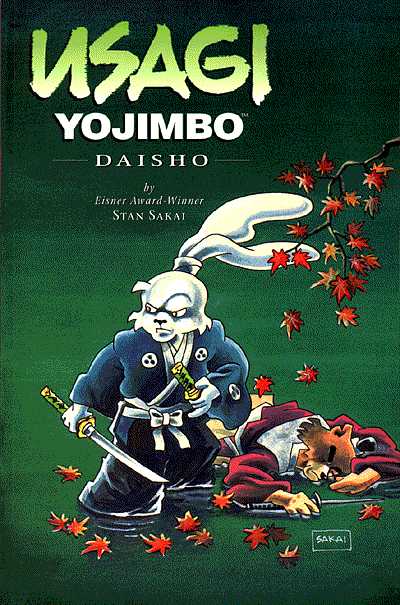Usagi Yojimbo continues to make his presence known with this, the next reprint of the sold out volume nine.
For gaming purposes, let me consider the following:
1. Random Encounters that aren't hostile. While its always a good thing to keep the wandering random encounters packed to the gills with the dreaded and dangerous, sometimes you want to feed the players some of the setting and give them some more connection to the setting.
Here, Usagi meets a Komuso "monk of emptiness" that wears a tengai, a woven basket over his head and plays a shakuhachi, bamboo flute. The meeting between the two goes well and the reader is rewarded with a real feel for the character, caste, and style of the komuso.
2. If there is no body... I've mentioned it before, but Stan, the author of Usagi, is notorious in that if there is no body, the villain will be back. Here, one of the members of the 'Shi' group from the previous collection who was buried alive, makes his return. When the players overcome their foes, is there a way that would make it more entertaining for the game if that villain's death wasn't so obvious and there was a chance of him coming back? If so, take it. If it'll feel like a cheap shortcut, ignore it.
3. Travel is tough. When the players are out and about, remind them of the simple pleasures of the towns. Things like being in an enclosed space, having people around, having water, heat, and a variety of food. Every time that Usagi comes to a town, even if its small and nameless, he's greatful because it means a chance to sleep inside on a bed.
4. Karma. Stan is a master of using karma to settle the score even when the Samurai rabbit isn't able to do so. These examples range from bully swordsmen making the mistake of challenging Usagi directly, to brothers backstabbing each other to make a gold claim. If you run a campaign and want the palyers to follow a certain style of gaming with a gentle hand, showcasing what happens to others in the setting can be a clear example of how the setting works moreso than just having a wandering paladin kill the drow assassin.
5. Slavery and Theft: I'll admit, that some things are easier to read about then to implement in a game. For example, making the players slaves. Usagi in his wanderings suffers the loss of his blades and his freedom from time to time but players, in my experience, generally don't take such loss well. Part of this might be the increasing complexity of game systems where everything from statistics and background abilities are designed to mesh into magic items and feats but part of it may just be the lack of freedom in a game about doing what you want. When using either slavery or outright theft, try to gauage how the players will handle it and if necessary use outside elements to end them if it goes against the grain of the group.
6. Not Everything Is As It Seems: Usagi gets to meet Stray Dog, another Ronin and another bounty hunter like his friend Gen. Stray Dog seems even more of an outlaw and rogue than Gen but when you look past that and see where he goes after the fighting is done, he doesnt' spend his winnings on himself, but rather on an orphanage. Something that may come along later to haunt the Stray Dog but in the meanwhile it acts as contrast to his stone cold killer bounty hunter persona.
7. Social Status: The society that Usagi comes from is very rigid in some of its aspects. Samurai are not peasants but that doesn't necessarily make them royalty. In today's politically correct world where everyone can be anything, the idea of social mobility is fairly ingrained despite the realities that most often people don't switch social classes. When allowing players to design their characters, see where their coming from, what they're trying to do.
There is no point in making a half-orc female paladin that strives against the social order and against stigma associated with half orcs, women, or half orc women being knights if none of those things are an issue. It doesn't mean mechanically the idea is unsound, but if the role playing reasons for selecting a certain combination don't apply, either have the character come from a reigion where they did apply or inform the player of the campaign's freedoms which ironically act as another type of character restriction.
Subscribe to:
Post Comments (Atom)






No comments:
Post a Comment